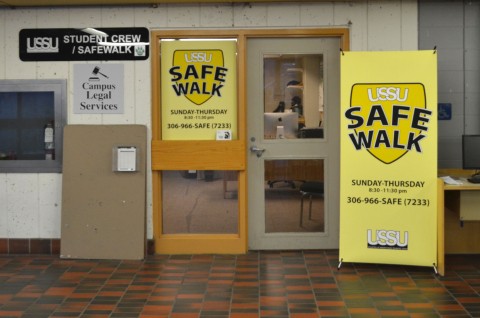University students may face a myriad of legal issues throughout their academic careers but often lack the financial means to obtain legal assistance. In order to address this issue, Campus Legal Services provides free legal information and advocacy for students.
CLS has existed at the University of Saskatchewan since the 1970s but has now focused on improving its services and efficiency with the help of Jessica Quan, vice-president academic affairs at the U of S Students’ Union.
Nathan Leitner, a second-year law student and student director of CLS, explains that this service is beneficial for students and that it was especially crucial to establish this legal clinic on campus.

Campus Legal Services are now located in the Arts Tunnel next to ISSAC.
“It is important to us as law students to be able to help provide access to justice for our fellow students. A free, accessible [and] convenient location for students to be able to seek legal help is a valuable resource to the campus community. Often, students would not receive legal advice were it not for CLS,” Leitner said, in an email to the Sheaf.
CLS is a law-student-run volunteer clinic aimed at assisting U of S students with various types of legal support. The clinic receives funding for its office operations from the USSU and recently moved to the tunnel between the Arts Building and the Place Riel Student Centre. Leitner says that the legal assistance provided can include landlord-tenant disputes, academic and non-academic appeals, social assistance, small-claims court cases, automobile-insurance claim appeals, student-loan issues and consumer problems.
Leitner explains that the U of S CLS is a chapter of the national law-student program called Pro Bono Students Canada, which outlines three goals for the services provided at the U of S.
“PBSC has three key objectives: provide law students volunteer opportunities to develop their legal skills, have a positive impact on the legal profession by promoting the value of pro bono service to the next generation of lawyers and increase access to justice. CLS delivers on all three of these objectives,” Leitner said.
Quan explains, in an email to the Sheaf, that she has been working alongside CLS to identify ways that this service could be streamlined when addressing issues of academic misconduct. Last year, the clinic provided legal services to 18 students, and the majority of cases concerned academic and residential issues.
Leitner believes that working on the various cases at the clinic will allow the student volunteers to develop skills that will be beneficial for their careers.
“Our law-student volunteers are able to work on their interviewing, advocacy, research and problem-solving skills on real cases. These are valuable traits that will serve them well as practicing lawyers,” Leitner said. “Additionally, it gives them an understanding of the importance of pro bono legal work and how important access to justice is for the future of the legal profession.”
Because CLS is operated by student volunteers, the service is not open during the summer and may also have a high turnover of volunteers, as it relies on the willingness of law students to participate in the program. However, Quan is working with CLS to address these concerns and provide support for the service over her term, as she believes students will feel much more supported in a university setting knowing that this service is available.
“I plan to continue working with CLS over the upcoming year to identify areas [where] the USSU can provide support,” Quan said. “I also strive to have a consistent and clear line of communication with their office. With these two aspects in mind, CLS and the USSU will be better equipped to serve students in the future.”
—
Nafisa Islam
Photo: Emily Sutherland